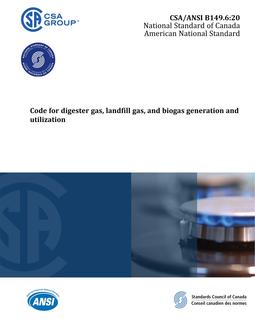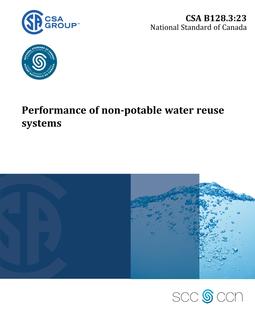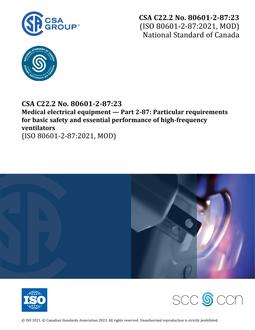
CSA ANSI B149.6:20
Click here to purchase
Preface:
This is the second edition of CSA/ANSI B149.6, Code for digester gas, landfill gas, and biogas generation and utilization. It supersedes the previous edition published in 2015.
The major changes to this edition include the following:
- The Scope was amended to clarify code coverage and exclusions.
- Several definitions were added, e.g., qualified personnel, relief device, safe location (for venting of gas), and valve proving system (VPS).
- Several definitions were clarified, e.g., biogas (removed the heating content reference), hazardous area (harmonized with applicable codes), sludge holding tank, stand-alone membrane gasholder, tank-mounted membrane gasholders, and test firing (firing valve).
- Compliance with the requirements of this Code for the installation at landfills upstream of the main inlet valve on the vacuum side of the blower has been removed from the scope of this Code.
- Flexible metallic hose was allowed to be used to connect piping to other than appliances.
- The requirement for a lock-up positive shut-off pressure regulator upstream of an appliance valve train was removed from Code.
- The requirement for a flame arrester upstream of the relief valve on a gas storage container that is designed to store gas at a pressure above 100 kPag (14.5 psig) has been removed.
- Examples for hazardous area were expanded to include odour control, equipment, components open-type gas compressors, or blowers.
- Requirement of having an automatic safety shut-off valve certified to ANSI Z21.21/CSA 6.5 and marked C/I to shut-off the landfill gas supply to a waste gas burner that is not equipped with safety shut-off valve(s) was added to the Code.
- Landfill pipe slope percentage was removed from the Code.
- Testing method for membrane gasholders used in biogas installation has been modified.
- Some of the revisions in Annexes include revised requirements for pressure test point (Clause D.2.8), manual shutoff valves (Clause D.2.11.1), and valve proving system (Clause D.2.16), clarified requirements when a test firing valve (Clause D.2.11.9) or a check valve (Clause D.3.4) might not be required, etc.
This Code has been developed in compliance with Standards Council of Canada requirements for National Standards of Canada. It has been published as a National Standard of Canada by CSA Group.
This Code has been approved by the American National Standards Institute (ANSI) as an American National Standard.
Scope:
1.1 General
1.1.1
This Code applies to the installation of systems for the production, handling, storage, and utilization of digester gas in newly constructed wastewater treatment plants, as well as additions to and upgrading of existing systems.
1.1.2
This Code applies to the installation of systems for the production, handling, and utilization of landfill gas in newly constructed landfill gas systems, as well as additions to and upgrading of existing systems and temporary systems.
1.1.3
This Code does not apply to any infrastructure of a landfill upstream of the main inlet valve on the vacuum side of the blower.
1.1.4
This Code applies to the installation of systems for the production, handling, storage, and utilization of biogas in newly constructed biogas systems, as well as additions to and upgrading of existing systems.
1.1.5
This Code applies to piping systems in which the maximum operating pressures for piping used in digester systems, landfill gas systems, or biogas systems do not exceed 860 kPag (125 psig) for piping installed outdoors or 450 kPag (65 psig) for piping installed indoors.
1.1.6
This Code applies to the safety aspects of the operation and maintenance for handling, storage, and utilization of digester gas in wastewater treatment plants or landfill gas at landfill sites or biogas in biogas systems.
Note: This Code does not apply to substrate storage, long-term digestate storage, or pilot scale and research digesters in biogas systems.
1.1.7
This Code applies to existing digester gas and landfill gas systems where, in the opinion of the authority having jurisdiction, a hazard or potential hazard exists.
1.1.8
Within the scope of Clauses 1.1.1 to 1.1.6, there might be provisions not covered in this Code, in which case the applicable provisions of the authority having jurisdiction are to apply.
1.1.9
Renewable natural gas is excluded from this Code.
1.2 Summary
Annex G gives a clause-by-clause summary of this Code.
1.3 Terminology
In this Code, “shall” is used to express a requirement, i.e., a provision that the user is obliged to satisfy in order to comply with the Code; “should” is used to express a recommendation or that which is advised but not required; and “may” is used to express an option or that which is permissible within the limits of the Code. Notes accompanying clauses do not include requirements or alternative requirements; the purpose of a note accompanying a clause is to separate from the text explanatory or informative material. Notes to tables and figures are considered part of the table or figure and may be written as requirements. Annexes are designated normative (mandatory) or informative (non-mandatory) to define their application.
1.4 Dual dimensions
The values given in SI units are the units of record for the purposes of this Standard. The values given in parentheses are for information and comparison only.
Product Details
- Edition:
- 2nd
- Published:
- 01/01/2020
- ISBN(s):
- 9781488322389
- Number of Pages:
- 155
- File Size:
- 1 file , 1.6 MB
- Product Code(s):
- 2427386, 2427262, 2427262


